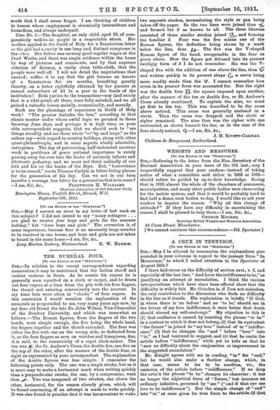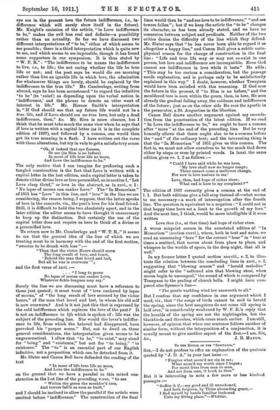A CRUX IN TENNYSON.
[To THE EDITOR OP THE "SPECTATOR."] SIR,—May I be all awed to summarize the explanations prod pounded in your columns in regard to the passage from "In Memoriam," to which I called attention in the Spectator of August 26th P
I there laid stress on the difficulty of section xxvi., v. 3, and especially of the last line, "And Love the indifference to be," as justifying an attempt at emendation. I think the various interpretations which have since been offered show that the difficulty is widely felt. Mr. Grindon is, if Jam not mistaken, the only contributor to the discussion who finds no difficulty in the line as it stands. His explanation is briefly, "If God, in whom there is `no before' and no 'to be,' should see in the future of my love indifference, it were better that death should shroud my self-contempt." My objection to this is (1) that confusion is caused by inserting the phrase "to be" in a context to which it does not belong, (2) that ite equivalent " the future " is joined to "my love " instead of to " indiffer- ence," (3) that he changes the "and " before "love" into "in," as I had ventured to suggest, and (4) that he omits the article before " indifference," while yet he tells us that he " sees no difficulty about the conjunction or improvement in the suggested emendation."
Mr. Knight agrees with me in reading "in" for "and," but he would also make a further change, which, in that case, seems to me to be needless, viz., the omission of the article before "indifference." If we drop the artic'e the phrase "to be" changes its character : it has no longer the adjectival force of "future," but becomes an ordinary infinitive, governed by " see" ("and if that eye see love to be indifference"). But the simple change of "and" into "in" at once gives its true force to the article (if Oat
eye see in the present love the future indifference, i.e., in- difference which- will surely show itself in the future). Mr. Knight's omission of the article, " in Love indifference
to be," makes the evil less real and definite—a possibility rather than an actuality. So far we have discussed two different interpretations of " to be," either of which seems to me possible ; there is a third interpretation which is quite new to me, and which seems to me impossible, though it has found some supporters in our symposium. It is thus stated by " W. F. R." : "The indifference to be means the indifference to live, i.e., to life ; the not caring whether the life be true life or not ; and the poet says he would die ere morning rather than live an ignoble life in which love, the admiration for whatsoever things are lovely, should be replaced by the indifference to the true life." Mr. Cumberlege, writing from abroad, says he has been accustomed "to regard the infinitive to be' (to exist') as depending upon the verbal notion in indifference,' and the phrase to denote an utter want of interest in life." Mr. Horace Smith's interpretation is, " If God should see that my future life would not be a true life, and if Love should see no true love, but only a dead indifference, then," &a. Mr. Rice is more obscure, but I think that he must take much the same view when he says that if love is written with a capital letter (as it is in the complete edition of 1897), and followed by a comma, one would then get its true meaning in a flash. I have written out the verse with these alterations, but try in vain to get a satisfactory sense: "Oh, if indeed that eye foresee, Or see (in Him is no before) In more of life true life no more, And Love the indifference to be."
The only motive that I can imagine for preferring such a tangled construction is the fact that Love is written with a capital letter in the last edition, and a capital letter is taken to denote either divine love or love personified, as in section 1, "Let Love clasp Grief," or love in the abstract, as in xxvi., v. 1: "No lapse of moons can canker Love." The " In Memoriam" of 1851 has "Love " in this line, and " love" in the line we are considering, the reason being, I suppose, that the latter speaks of love in the concrete, viz., the poet's love for his dead friend. Still, it is difficult to hold the two absolutely apart, and in the later edition the editor seems to have thought it unnecessary to keep up the distinction. But certainly the use of the capital letter does not require us here to think of a divine or a personified love.
To return now to Mr. Cumberlege and "W. T. R.," it seems to me that the general idea of the line of which we are treating must be in harmony with the end of the first section, "sweeter to be drunk with loss " :— "Than that the victor Hours should scorn The long result of love, and boast, Behold the man that loved and lost, But all he was is overworn ' "; and the first verse of xxvi.
. . "1 long to prove No lapse of moons can canker Love, Whatever fickle tongues may say."
Surely the line we are discussing must have a reference to those just quoted; it must treat of "love cankered by lapse of moons," of " the long result of love scorned by the victor hours," of the man that loved and lost, in whom his old self is now overworn ? And is it not just this that is expressed by the cold indifference which replaces the love of the past P It is not an indifference to life which is spoken of : life was the subject of the preceding line. Nor would the lover's indiffer- ence to life, from which the beloved had disappeared, have provoked his "proper scorn." But, not to dwell on these general considerations, the interpretation given seems to be ungrammatical. I allow that "to be," "to exist," may stand for " being " and " existence," but not for " to being," " to existence." The "to" is an essential part of our English infinitive, not a preposition which can be detached from it.
Mr. Slater and Canon Bell have defended the reading of the text "In more of life true life no more, And Love the indifference to be " on the ground that we have a parallel to this mixed con- struction in the list line of the preceding Irarse, " to see " Within the green the moulder'd tree, And towers fall'n as soon as built," • and I should be inclined to allow the parallel if the article were omitted before "indifference." The construction of the final lines would then be "and see love to be indifference," "and sea towers fallen"; but if we keep the article the "to be" changes its character, as has been already stated, and we have no connexion between subject and predicate. Neither of the two critics denies the difficulty of the line which they defend.
Mr. Slater says that "he has never been able to regard it as altogether a happy line," and Canon Bell gives a subtle meta- physical reason for the change of construction in the final line : "Life and true life may or may not co-exist in one person, but love and indifference are incompatible. Even God cannot see indifference in love while it lasts." He adds: " This may be too curious a consideration, but the passage needs explanation, and is perhaps only to be satisfactorily explained in this way." I doubt, however, whether Tennyson would have been satisfied with this reasoning. If God sees the future in the present, if "to Him is no before," and the mouldered tree is seen within the green, then, in love, He sees already the gradual falling away, the coldness and indifference of the future ; just as on the other side He sees the apostle in the persecutor, a St. Augustine in the libertine.
Canon Bell draws another argument against my emenda- tion from the punctuation of the latest edition. If we read " In Love the indifference to be," we ought to have a comma after " more " at the end of the preceding line. But he very honestly allows that there ought also to be a comma before the " and " of the ordinary text; and the interesting thing is that the "In Memoriam " of 1851 gives us this comma. The fact is, we must not allow ourselves to be too much tied down either by stops or even by printed words. In lxxxi. the same edition gives vv. 1, 2 as follows
"Could I have said while he was here, `My love shall now no longer range; There cannot come a mellower change, For now is love mature in ear.'
Love, then, had hope of richer store: What end is here to my complaint ?
The edition of 1897 correctly gives a comma at the end of L 1. But both editions give a full stop instead of—what seems to me necessary—a mark of interrogation after the fourth line. The question is equivalent to a negation : " I could not in that happy time have set a limit to the growth of my love." And the next line, I think, would be more intelligible if it were written
Love then (i.e., at that time) had hope of richer store.
A worse misprint occurs in the annotated edition of "In Memoriam " (section cxxvi.), where, both in text and notes, we read an unmeaning " here " for the correct " hear " in "hear at times a sentinel, that moves about from place to place, and whispers to the worlds of space, in the deep night, that all is well."
In my former letter I quoted section xxxviii., v. 2, to illus- trate the relation between the concluding lines in xxvi., v. 3, suggesting that "blowing season" and "herald melodies" might refer to the " softened airs that blowing steal, when meres begin to uncongeal," the sound of which is compared by Tennyson to the pealing of church bells. I might have com- pared also Spenser's line- " The gentle warbling wind low answereth to all."
But I confess that my confidence in one argument which I used, viz., that " the songs of birds cannot be said to herald the spring, since the best songsters do not come till spring is half over," is considerably weakened by W. F. R.'s reply that the heralds of the spring are not the nightingales, but the blackbirds and thrushes, which come much earlier. I am still, however, of opinion that when one sentence follows another of similar form, without the interposition of a conjunction, it is usually meant to give another aspect of the first.—I am, Sir,











































 Previous page
Previous page